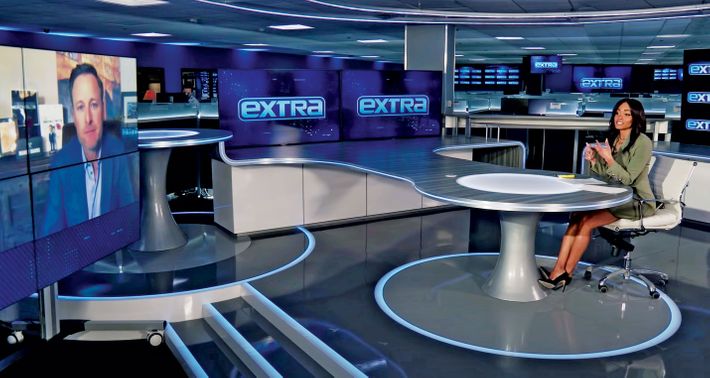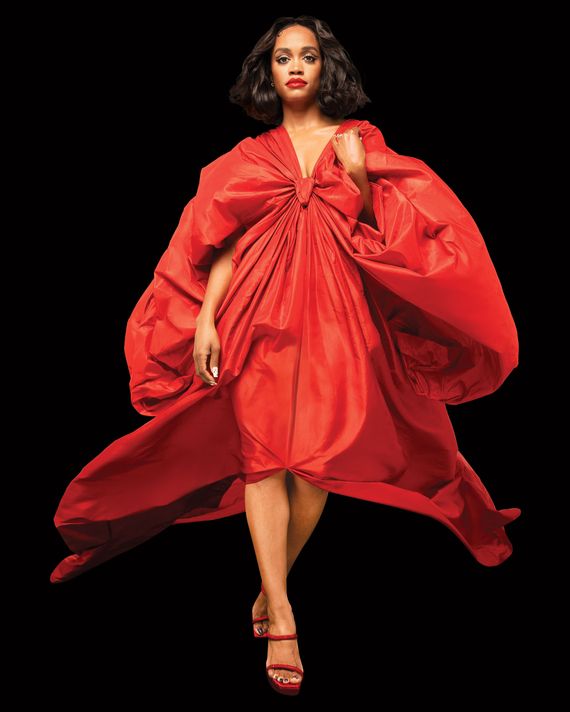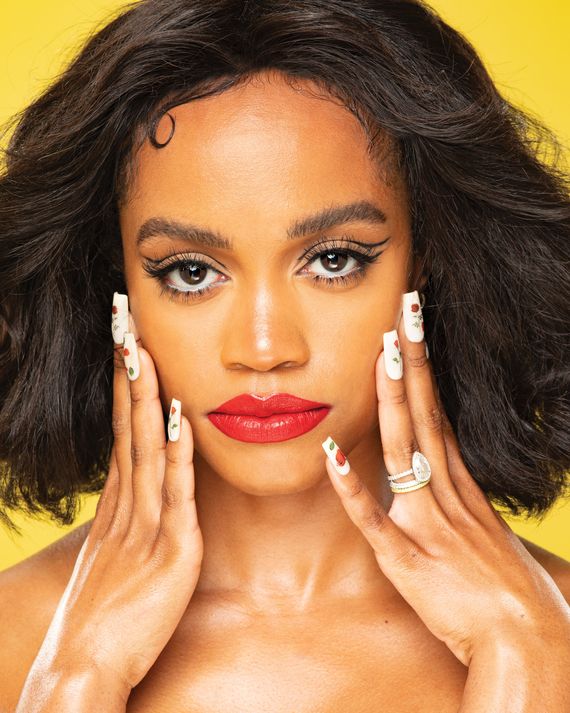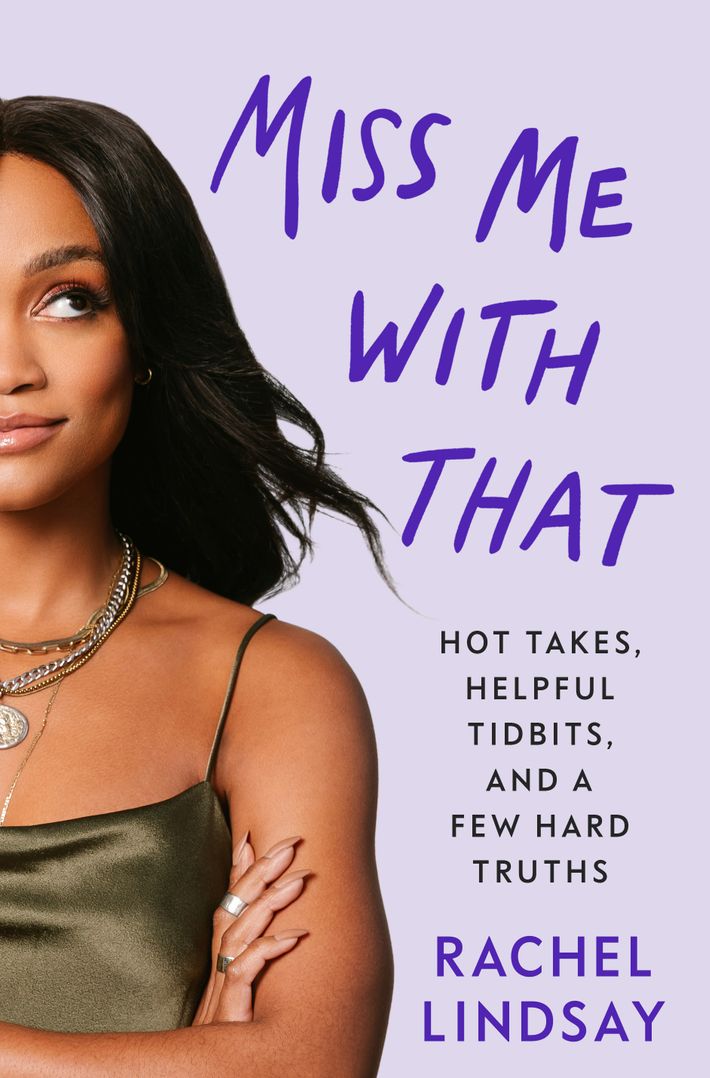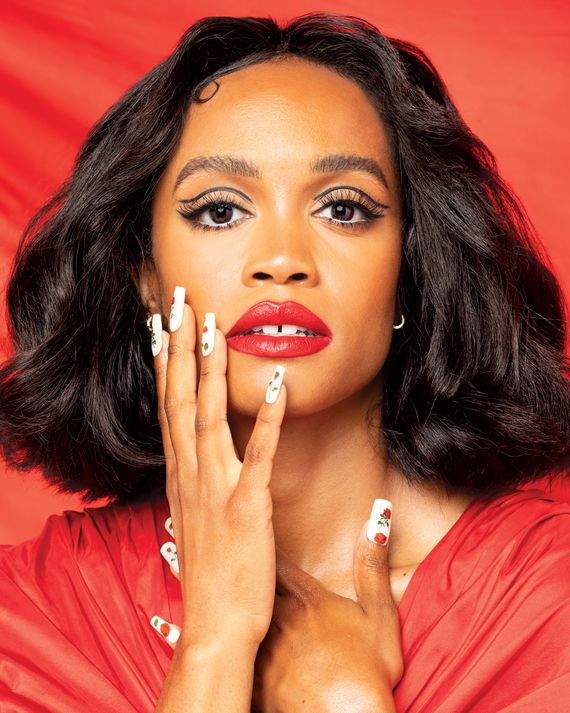
I knew my relationship with The Bachelor was over in February 2021, when Chris Harrison, the host and face of the franchise, showed his true self on national television.
I had been a full-time correspondent on Extra since the previous summer, regularly recapping The Bachelor as part of the job. So when there was a chance to speak to Chris about a recent controversy, it was obvious I’d be the one to do it. He patched in from his office, ever the host, sitting in one of his trademark casual suits in front of a mantel of Bachelor memorabilia, including a bobblehead of himself.
“What are your thoughts about Rachael Kirkconnell and the allegations attached to her?” I asked. A simple question about a situation that was anything but. Weeks prior, Kirkconnell, the soon-to-be winner of Matt James’s season, was revealed to have attended an antebellum-themed fraternity formal in 2018. There were photos. Nobody had made a statement — not Rachael, not Chris, not the network. I wanted to know how the franchise felt now that one of the final four contestants on the first Black Bachelor was engulfed in a race controversy. I wanted someone to acknowledge it.
“We all need to have a little grace, a little understanding, a little compassion. Because I have seen some stuff online — again, this ‘judge, jury, executioner’ thing, where people are just tearing this girl’s life apart and diving into, like, her parents, her parents’ voting record,” Harrison said. “The woke police is out there.”
He wasn’t defending Rachael, he repeated over and over during the 15-minute segment in which he essentially did just that. If I had gone to that party, I asked him, what would I represent? He told me that 50 million people had attended a party like this. I maintained that attending such a party was not a good look, to which he responded, “Is it not a good look in 2018, or is it not a good look in 2021?” As if things couldn’t have been considered racist in 2018. He called for sympathy for “this poor girl, Rachael.” He said all this with a passion I had never seen him assert. And neither, I think, had America. We had only seen Chris Harrison perform as a host; this was like catching him with a hot mic.
I wouldn’t say Chris and I were friends, exactly. When you’re the Bachelorette, you’re traveling with him, sitting in hotels and airports. There’s a lot of hurrying up and waiting, and he’s the one you do it with. During my season and after, he became someone who gave me advice on how to navigate the show and the celebrity of it. I called him my fairy godfather. We’d had our highs and lows, but there had been mutual respect until this interview. I felt disrespected, but I maintained my composure because I had to.
Three days later — after Chris issued a public apology to Bachelor Nation and to me (I accepted it) — I went on Higher Learning, the Ringer podcast I co-host with Van Lathan. I couldn’t maintain my composure anymore. I was exhausted, I said. And I needed to step away from the franchise.
It’s funny to think that in 2018, when it was still “acceptable” for Rachael K. to attend a racist fraternity party, it had only been one year since I became the first Black lead — male or female — in the 16-year, 34-season history of the show. In 2018, I felt like I had changed the franchise just by representing myself as a Black professional woman in her 30s — those things had never before been seen on the series. In the years since, I had gone from a former contestant who advocated for more diversity to one who spoke critically about the show and tried to hold those involved with it accountable. By the time that segment with Chris aired, I was known as the contestant who was always starting trouble. “That Rachel Lindsay,” the one who couldn’t stay quiet, who bites the hand that feeds, Bachelor Nation’s public enemy No. 1. Later, I would be known as the one responsible for Harrison’s eventually leaving the franchise. (He announced his departure earlier this month with a reported eight-figure settlement. And if he spends all of that, I’m sure the fans will somehow blame me, too.) Recently, during the drama with Matt’s season, I listened to an earlier episode of Bachelor Happy Hour, another podcast I co-hosted. I was surprised to hear myself having fun because now I sound as tired as I am. After 100 episodes, I announced my departure from that podcast. I’m exhausted from defending myself against a toxic fandom.
I’ve often wondered if it felt like a 180 to the franchise when I became its biggest critic. As my sorority sister would put it, “You played the part, and when you were done, you called them racist with your whole chest.” After all, they had cast me because, on paper, I made sense. I couldn’t be like the Bachelorettes who had come before — somebody who was still living at home with her parents, who had “pageant queen” on her résumé. I was a lawyer. My father was a federal judge. I had a squeaky-clean record. I had to be a good Black girl, an exceptional Black girl. I had to be someone the viewer could accept. And I was a token until I made sure I wasn’t. The thing is, the day I went on the show, I didn’t wake up and say, You know what? I’m going to start standing up for myself. I was taught at a very young age to speak up about injustices. It was no different with Bachelor Nation. And I don’t think they ever saw it coming.
When I first went on The Bachelor as a contestant, I wasn’t looking for love. I was open to it. But what I wanted was to escape my reality. I was 31 years old, and I had achieved everything I wanted careerwise. I was working for a great law firm in Dallas, but I didn’t feel fulfilled. I had just come out of a five-year relationship with a guy I had thought I would be with forever. He ended things so nonchalantly: “Yeah, I don’t think it’s going to work.” I felt completely insignificant. I was running around wild every night, looking for someone to see me.
In 2016, two white co-workers came into my office and told me I should do the show. I had never watched it before. All I knew about it was that Black people don’t go far. And something about roses. They said, “Rachel, if you do it, you’ll go far.” I started to think, Why not? For the first time, I had no expectations for my life.
I auditioned in June, and I had my final interview in August. I knew then that they wanted me. I walked into a one-on-one with a producer who said, “Who’s your ideal person? Who would your parents love to see you with?” “Barack Obama,” I replied. They were like, “You know what? No more questions. Let’s move you to the next interview.” I walked into another room, and it was a sea of people. Nobody was Black. In the front, there were three chairs: two for the executive producers and one for me.
The first thing one of them said was “So you’re Black. As you can see, we’ve had a really hard time casting people like you.” “I thought we would have to talk about that later,” I replied. “But let’s talk about it now. I don’t watch your show because we aren’t represented. It’s not for us.” What I was saying didn’t scare them. “You should tell your job about the show,” they said. They were telling me I was going to be cast.
I said yes. It was the first time in my life I felt like I was flying. That I had done something that veered from the straight and narrow. I accepted without knowing who the Bachelor that season would be. When they announced that it was Nick Viall, my co-workers said, “This is amazing. He’s open-minded. He’s interested in people of color.” (But isn’t it sad they had to make that disclaimer?) He had just gone on the franchise’s spinoff, Bachelor in Paradise, and he had expressed interest in meeting Jubilee Sharpe, who is Black. I thought, I don’t know who these people are. So I decided to watch the previous season, starring Ben Higgins.
Ben’s was the 20th season of The Bachelor — 20 seasons of the same white male leads, and mostly white contestants, vying for true love. But I liked Ben. I liked the way he handled relationships. He made the women feel appreciated. I didn’t like the cattiness of the women. I didn’t like the way they were treating Jubilee. Watching it, I started crying. I thought, I don’t like the dates. This is cheesy. My friends are going to laugh at me. I’m not going to have any respect in the legal field. I almost pulled out. I called the girls who had signed me up and said, “I cannot do this.” They said, “Rachel, you’ll be fine. You signed a contract. You have to do it.”
Days before I went on the show, I called my ex. I was hoping he’d tell me not to go. He said, “Well, don’t say my name.” I thought, Oh my gosh, this man wants nothing to do with me. And I’m still looking for anything from him. Maybe 24 hours later, he texted me, “You don’t honor the sanctity of marriage. You’re not who I thought you were.” He was trying to shame me into not doing it. It was just what I needed to hear to motivate me going in.
One thing The Bachelor gives you: the ability to cut yourself off from everything. Your phone, your TV, the internet. You’re left with your own thoughts and desires. On the first night, the women exit their cars to greet the Bachelor in front of the mansion. They did my hair Texas-big. I had to go back to my room and comb it down. The producers came by and asked, “What dress are you wearing?” I said, “I want to wear this green dress.” They encouraged me to wear red. (When the season came out, 15 of us were wearing red, and it became a story line.) I asked them if I should have a gimmick. A producer responded, “I’m going to be honest with you. We tell people to do that who we think may not survive the first night.”
That evening, I got the first-impression rose, which is awarded to a contestant on night one. Nick walked out with it, and I moved over because I thought he was going to give it to a woman sitting next to me. Then he said “Rachel.” Later, I turned to another contestant, Dominique, and asked, “Has a Black girl ever gotten the first-impression rose?” She said, “Girl, no, never.” I started to get paranoid. I was going around to producers, asking, “Who told Nick to give this to me? What’s going on here?” One of them finally said, “Rachel, he gave it to you because he wanted to. Accept it.”
Because I got the rose, I felt seen, I felt heard, I felt liked. I instantly fell for the fairy tale. The other contestants were saying, “You’re going to at least be top five.” It started to sink in that no Black contestant had ever gone that far. When I got back to my room, I was in a daze. I lay on the bed holding the rose and thought, Oh my gosh, this is really happening.
The Bachelor has mastered the connection between the in-house producers and the contestants. The producers’ job is to hang out with you, to gain your trust, to get your guard to come down. Then all of a sudden one of them will say, “What do you think Nick’s doing on his date? Let’s go in a room and talk about it.” But you get into a rhythm. You find your group of friends. Whitney, Astrid, and I would go downstairs before the sun came up and go to the gazebo before the producers would ask what had happened the night before. We went on walks. Then they started having a camera follow us, so we lost that. But we were trying to find those moments to regain our sanity.
The show tapes for ten weeks. In the beginning, you’re stuck in the mansion. I hated it. I always tell people it was the dirtiest place ever. Think the movie The Money Pit. Once you get inside, you see the cracks in the foundation. Appliances don’t work; the backyard is not complete. (This in addition to 22 women living in three rooms.) By the time we left, my eyes were puffy. I had an allergic reaction from the lack of sleep, drinking too much, and feeling dehydrated. When another woman would leave the house for a date, you’d be so excited somebody got out that you’d genuinely say, “Tell us about it. Where did you go? Is he a good kisser? What did he say?” There was one group date where we did track and field. Alexis won the shot put, so she jumped up on Nick and gave him a kiss. She ran back to us and said, “He made my vagina dance.” That was the kind of conversation we would have. (She never felt that way again. The next time she kissed him, she said, “I don’t think he likes me anymore because he lizard-tongued me.”)
At some point, I started noticing Black women were going a long way. There were seven of us that year; Jaimi, Jasmine, and myself were in the top ten, which you hadn’t seen before. We were close, but interestingly, we didn’t have conversations about being Black women. Because we were fucked up the majority of the time. I got to be 22 again, and I fully was. We didn’t talk about the issues because we were enjoying ourselves so much. We were just happy to be there, to have the company, to have the friendship.
After the first night, I didn’t think deeply about race again until there were six women left and I was the only Black one. We went on a trip to Bimini, in the Bahamas, and things grew tense between me and Vanessa Grimaldi, the white woman who eventually won. We weren’t close — this is no secret. She really liked Nick, and I did too. He and I were both older, we had deep conversations, we connected physically, we shared a sense of humor. But I was able to compartmentalize because I knew we’d never get married. (I call him my favorite ex.) Vanessa liked him so much she couldn’t hear about how he kissed another woman, which lets you know how deep her feelings were. As a result, she was unable to connect with the other women in the house.
As the numbers dwindled, our issues became so obvious the producers said, “You need to talk it out.” They staged a scene: I was sitting down, pretending to read a book. Vanessa came over and said, “Hey, can I talk to you?” I look back and see how that setup made her look like the bigger person. The first thing she said to me was “I feel like you bullied me in the house.” Immediately, I felt my Blackness was on display. I knew the audience was going to look at me as an angry Black female.
In true lawyer fashion, I said, “That’s an extreme word. I’m going to need specific examples of how I bullied you.” She cited things like how I didn’t look her in the eye during a conversation. I laughed. “That’s not bullying,” I said. “That just means I’m probably not fucking with you.” She kept going. “You’ve ostracized me in the house.” (I thought, No, you did that to yourself.) I never raised my voice because I was aware of what was going on. When she started getting emotional, I knew, This is going to be bad. She’s crying; I’m not. I’m going to look cold. We did not come to any type of agreement. (I am happy to say that, in real life, we put our differences aside and have a great and supportive relationship.)
When it was over, I stormed out — and of course the producers said, “Let’s talk about that. Why would you not show emotion?” I lost it in the interview. I was bawling. I tried to explain, “You do not understand what it is to be a Black woman in this house full of white folks and for a white woman to cry in your face and call you a bully.” Did she call any of the other women a bully? No, she picked me. One, because she knew I was a threat — Nick liked me the second most. Two, I felt she was projecting an unconscious bias onto me. I said, “I hope y’all show this in its entirety.” An executive producer pulled me to the side and said, “This will never air.”
There were moments like that when they protected me. Another time, I’d had two mixed drinks, and I was out-of-my-mind wasted. Astrid was holding my hair back in the bathroom. (I drunkenly told her, “You are my only real friend.”) They could have brought cameras in there. They didn’t. I sat in the ceremony that day as Nick gave out roses, my head resting on Astrid’s shoulder. My hair was disheveled. I wasn’t always like that, but all it takes is one mess-up. They could have taken those clips and depicted me as a wild Jezebel. They didn’t because I would never come out on top.
An insider later told me they had been thinking of me as the first Black Bachelorette way back during my audition. At the time, there had been a shift in leadership at ABC. Channing Dungey, who is a Black woman, had just taken over as president. At the TV upfronts, she said, “There will be a lead of color while I’m here. I’m making it my priority.” They didn’t say this part, but it couldn’t be a man. A Black man going into the homes of white women and sleeping with their daughters is a narrative the audience still can’t accept. They’re protecting them from that, as we saw with the Matt James season — they didn’t even show him waking up with Rachael after their fantasy-suite episode, during which the lead spends the night with a finalist. So it had to be a Black woman.
To become the Bachelorette, I had to get dumped by Nick. We were in Finland for our fantasy-suite episode. I made my producer take me to Victoria’s Secret. I had this whole thing about being Mrs. Claus because we were going to Finland. I had red lingerie. I bought a mink hat. The day before had been the 2016 presidential election — I stayed up all night and watched Trump win. I ended up getting drunk on the date because I was so upset. Meanwhile, the producers were pressuring me to say “I love you” to Nick. I liked him, but I was not ready to express it in that way. I thought, Shit, I’m just going to say it so they leave me alone. That’s how you start to feel.
That night, Nick said to me the things producers had probably prepped him on as well: “If you had to check your ego at the door, what would your heart say?” I go, “That I’m falling in love with you.” I threw my hands over my face, and we both started laughing. I said, “Let’s get this over with so we can start this fantasy suite.” Nick said he did not want to sleep with any women because he had been so sexualized on Bachelor in Paradise. We didn’t get there, anyway. I blacked out. Nick gave me Tylenol and carried me up the stairs. I never even made it into the Mrs. Claus outfit.
After that, I was off the show. I was devastated. Not because I had lost the love of my life. But when you’re in that world for ten weeks, that’s your reality. There’s one man in your life. The producers are your parents. The girls are your friends. And the moment you don’t get a rose, the bubble pops. That’s the overwhelming feeling the audience witnesses when a contestant steps into a limo and speaks to the camera through tears after she has been cut. Your tears are everything you have to let go of and everything you have to go back to. You just feel very rejected — by the franchise, the process, the guy.
Twenty-four hours after I left Nick, my producer came to me and said, “The EPs want to talk to you.” We went to a coffee shop in the middle of the capital of Finland’s Lapland region. I thought they were checking on my well-being. And then they said, “What do you think about being the Bachelorette?”
My immediate reaction was “No.” I didn’t want to lose my identity. I didn’t want to be known as a reality-TV star. I didn’t want to lose respect in the workplace. Then one day back home, I went to church. It’s a big Texas megachurch, and we were all congregated in the lobby after service one Sunday. My season of The Bachelor wasn’t out yet, but someone there knew I was on it. They said, “My daughter likes the show. I’m so excited she can see someone who represents her. And if the rumors are right, you go far.” I started wondering if I was looking at it the wrong way. Yes, it’s a silly reality show. But how many people haven’t seen a positive representation of a Black woman, someone who has the chance to be adored by men of all races, backgrounds, professions? I thought maybe the moment was bigger than me.
The process begins with a round of interviews. You meet with the heads of the production company and the network. Bachelor creator Mike Fleiss told me off the bat, You’re the only person we’re considering. We never do this. Please say yes. I expressed my concerns about being the first Black lead. I talked about the fact that there were no Black people behind the camera and how I wanted that to change. I wanted them to come to me if they didn’t understand something. I wanted a diverse season. I wanted it to be Black in every way. They deferred to me and asked questions. Was I comfortable with the makeup artist? How did I want my hair done? I felt like they were listening to me. So I said yes.
Can a show that’s built on stereotypes handle race well? It’s a question that reverberated throughout my season, which was the most diverse one to that point. I connected with way more of the men than I had anticipated. I met, and later married, the love of my life, Bryan Abasolo. When he started speaking Spanish to me on the first night, I was like, Okay. We’ve got some flavor here. We had an immediate banter.
Still, I had expected more diversity. And I hadn’t prepared for how much the casting would prioritize people who might cause drama in the house. In my case, the drama was largely centered around race. I didn’t want to use the show to tear the Black men down. But I was constantly put in situations where there was a little bit of that going on.
For one, several of the Black men on my season were not into Black women. This may not seem like a big deal, but Black women can feel it when you’re not into them. Or if you are, you’re the worthy exception. Story of my life — dealing with colorism and being held to a European standard of beauty. The producers found that narrative fascinating: “What do you mean he’s not into Black women?” “This is not a novel concept,” I said. But to them it was — which is how Will Gaskins ended up getting a one-on-one date with me. They wanted to explore the narrative of a Black man who had barely dated any Black women.
It was the worst date. He wouldn’t hold my hand. He was so uncomfortable kissing me. There was music playing in the street, and he didn’t want to dance with me. A producer said, “You’re going to have to send him home at the end of the date. We can’t even edit it to make it look like he likes you.”
And then there was Lee Garrett. As it was reported while my season aired, his Twitter was full of hate toward Black people and other marginalized groups. He instigated fights on the show. He didn’t rile up men who looked like him. It was only the Black men — Kenny, Josiah, DeMario, and Eric. The show used this person to play into the stereotype of the angry Black man. It didn’t fully dawn on me until later because I didn’t know Lee was racist during filming. As details about him started to come out, I tried to give the show the benefit of the doubt. Maybe they didn’t know. But as I reflected on it, I thought, No. Let’s say the producers didn’t know about the tweets — you still brought on a guy who has no experience with Black people, who is from Mississippi. You brought him on knowing he was ignorant. You brought him on to see what could happen. You can play the “We didn’t know he was racist” card, but there’s no way you didn’t know he would cause a problem in the house.
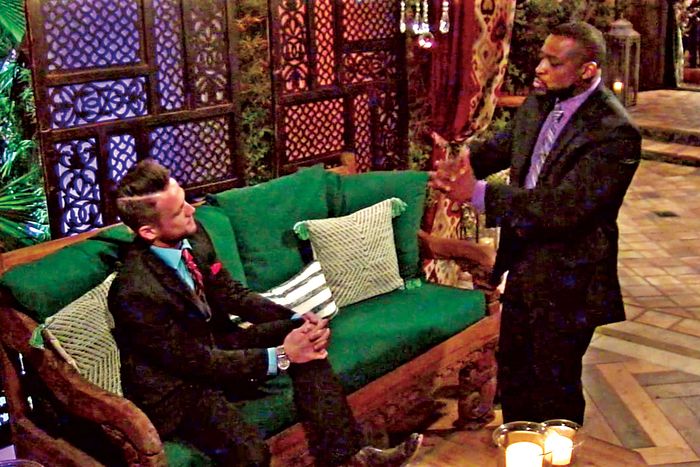
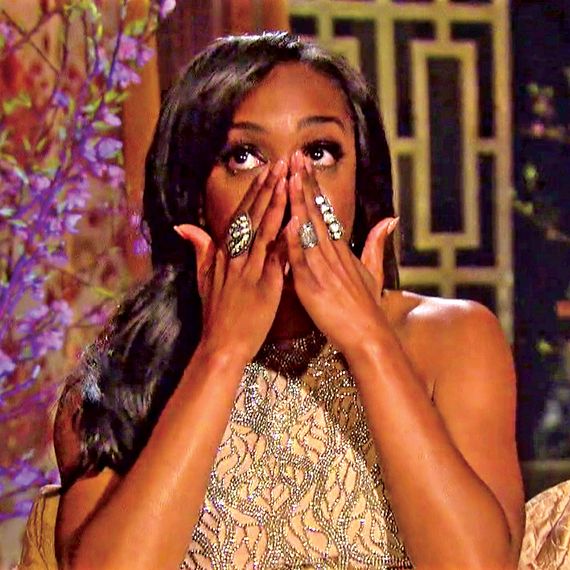
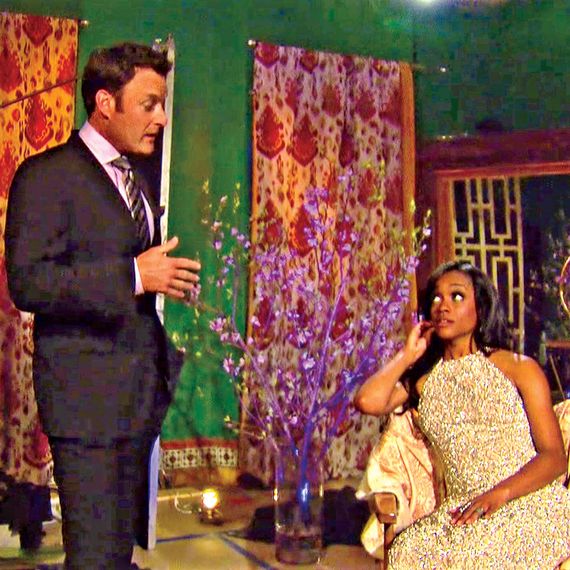
What they did with me they couldn’t have done with another lead. You’re not going to bring a Black person on who doesn’t like white people. It doesn’t work. There’s always one story line that causes drama each season, and for their first Black lead, they allowed it to be a racist one. They chose the low-hanging fruit. It told me everything I needed to know.
Things came to a head during episode four. There is a big moment where you see me crying. It was a rose-ceremony night, and I was trying to figure out whom to send home. I was talking to one contestant, and I could hear Lee and Kenny arguing in the other room. I didn’t have a clear perspective on what was going on, but I wanted to get rid of the drama in the house. I wasn’t thinking, I have to keep this many Black people and this many white people. And the response I got was, “You can’t send a Black man home.” They didn’t want to lose the season’s sheen of diversity.
“That’s your fault,” I responded, “because of how you cast this season. You didn’t give me enough men of color — not just Black men, men of color.” I was getting angrier and angrier. I didn’t care that I was miked up. The fact that we had to ration the Black men was extremely upsetting. And I said, “You have no idea what it feels like to be the first person representing Black people to your lily-white audience.”
It dawned on me, looking around the room, that I had nobody to talk to. They had hired Black producers for my season (unlike Nick’s, where there was not one), but those producers worked with the cast in the house. Nobody was with me. I loved my producer, Caitlin, whom I had connected with during Nick’s season. But she was white, and there were certain things she was not going to be able to understand. I told them, “You are leaning on me to guide you through what it’s like to handle a Black lead. And I have to be the Black lead. I have to educate y’all and navigate my system.” It was the first time I had allowed myself to feel that emotion. It felt good to let it out, but it was also frustrating because I wasn’t going to get any answers. And then there was a knock on my door. I thought, Please do not bring in Chris Harrison. And who was it?
I looked up, and I said to him, “What are you going to do?” He said, “Everybody’s here to help you.” But the glaring reality was that I was alone. When I signed up, I knew I was alone. When I cried in that moment, I knew I was alone. And when I stopped crying, I knew I was alone. My tears weren’t going to conjure up Black producers to help me along this journey. Those tears were for me. And then I put my big-girl pants on and got over it. (That was my defense mechanism, pre-therapy.)
I went on the show in part because I wanted to depict a Black woman at the center of a love story. However, it’s up to the producers to display your happy ending. I got mine in real life, but the viewers didn’t. At the end of my season, you didn’t understand why I chose Bryan because it was easy to get caught up in the narrative built around my runner-up — a white man named Peter Kraus.
I liked Peter. There was a time, in the beginning, when I thought it could be him. Bryan was so charming, but viewers saw him as cheesy. He was from Miami; he was portrayed as a playboy. He told me he never felt more Latino than when he was on the show because of the way producers edited him and what they wanted him to talk about. Practically every time he walked in, they played Latino music. Peter, meanwhile, was the audience favorite. But if you looked closely, he didn’t offer anything other than being a fine physical specimen. He fit the prototype of a Bachelor Nation contestant. Because Bachelor Nation applauds mediocrity. And because he’s a white man and he’s attractive, there are certain stereotypes that are placed on him that are positive. He’s a good person; he has a good heart; he’s from the Midwest; he works hard.
My head had already started to come out of the clouds with Peter by the time of “Hometowns” — the episode in which the Bachelorette visits the final four contestants at home with their families. They don’t usually like for you to meet the person’s friends. They don’t think the contestant takes it as seriously with homeboys or homegirls around. But when I went to Peter’s hometown, Madison, Wisconsin, the producers wanted to introduce me to his friends. We planned to meet them at a bar. I walked in and saw two Black men and two white women sitting at a table. I turned to my producer and gave her a look. I wish they had caught my face on-camera — the way I turned and stared at her, like, Really, bitch? They separated us — Peter got to talk to his homeboys, and I was with the women, who talked about having “mixed babies” and what it was like to be an interracial couple. I couldn’t believe it. I’m Black. I have interracial couples in my family. I’m old enough to understand what I’m entering into and the difficulties that come with it. I felt exploited.
If anything, that situation turned me off of Peter because I couldn’t see myself hanging out with them. They were nice, but it was so contrived. The producers really thought, How great! All these mixed couples can come together. They were only looking at the optics of the situation.
And that’s the thing. We didn’t get into the depths of what it can feel like for a Black man to date a white woman in the Midwest. We didn’t get into the struggles, into how hard it is to raise biracial children. We didn’t have the important conversations. It was a missed opportunity, which is a theme within the franchise — Oh, this looks good, the producers think, without peeling back the layers of what it means. I said to my producer, “Why would y’all put me in that situation?” She said, “We thought it would be a good story line.” They thought it would make me comfortable. It shows you how wrong they get it. They are assuming how we think, rather than actually talking to the person whose real-life experience it is.
There wasn’t a lot of drama in the house after Lee, so the narrative shifted to Peter. In the finale, Peter infamously told me he wasn’t ready to propose even though he loved me. It was difficult to break up with him — when you toy with the idea of It could be this person, and you realize it’s not, it’s hard. But he was my ex personified — giving me enough to stay, never fully committing. I could tell he didn’t know what he wanted in life. Yet so much of my finale made it seem like I’d settled for Bryan because Peter couldn’t give me what I wanted. Publicly, I was robbed of my love story.
For the After the Rose special, I sat on a stage with Chris and Peter while we relitigated our breakup. Peter apologized for something cruel he’d said at the time — that I would be settling for a life of mediocrity without him. I responded onstage by saying I was living my best life. Somehow, that was twisted into a negative thing. Chris asked me if I was angry; Peter said he felt attacked by me. He became the victim in that narrative. I was sitting there seething. I knew my reputation was over in that moment. All people saw was this devastated white man: How dare this angry Black woman treat him like that when he is so remorseful about what he did?
There’s no denying The Bachelor franchise changed my life. It’s a love-hate relationship. People ask me, “Do you think the show should end?” I would never say that because I know too many people employed by it. But you’re under contract your first year, so you feel pressure to speak about it positively. You’re riding a high with your relationship and with the show. You’re getting opportunities you never thought you would. When it ended, I was still hopeful I was making a difference. That my role would create opportunities for more leads and better stories for people of color.
The first year after my season, I went on The Bachelor Winter Games. I appeared on an episode or two to talk to new contestants. If someone asked me who should be the next lead, I would always promote a person of color. And I did notice incremental changes — in subsequent seasons, people of color would end up in the final rounds and were considered fan favorites.
It wasn’t until around 2018 that I started to feel uneasy. I watched the show fall back into old patterns. I grew annoyed by Becca Kufrin’s season because of the way the producers chose to depict a white woman’s story versus mine. She got engaged to a Garrett Yrigoyen, who had a history of liking offensive tweets. They tiptoed around it and gave him an opportunity to explain. It was as if they’d checked off a box with me, and once they’d done that, they went right back to doing what was comfortable and easy.
I thought, Okay, maybe I was the sacrifice, the experiment. Maybe they’ll get it right for the next person of color. So when was that person coming? On Arie Luyendyk’s season in 2018, Seinne Fleming was the clear front-runner to be the next Bachelorette. She was a commercial-real-estate agent, beautiful — ostensibly an ideal candidate in their eyes. They didn’t pick her. Still, I understood why the person they did pick, Becca, made sense, based on the narrative of Arie’s season. But in fall 2019, when they didn’t pick Mike Johnson, a contestant on season 15 of The Bachelorette, to be the next Bachelor, I was livid. He is a veteran, and there’s never been a veteran lead. He has got a million-dollar smile. He’s handsome. He was a fan favorite. They chose someone with a pubescent haircut: Peter “Make Sure You Know I’m Half-Latino” Weber. That was my breaking point. I was like, You know what? I’m going to use my platform to call out the show.
Every time I spoke out about the latest bullshit, producers would get in touch and say, “We understand your frustration. We’re trying to do better.” But nothing would happen. I realized nobody but me was going to say anything. And I knew I could say these things with no repercussions — because what are you going to do to your first and only Black lady?
In May 2020, things grew untenable. A video of former Bachelorette Hannah Brown saying the N-word surfaced. I talked to her privately. I publicly held her accountable. It became a news story around the time of George Floyd’s murder. I started to get depressed watching what was happening to my community. I couldn’t take three steps without crying. Protesting was the only thing that gave me relief. That June, I said I would begin to “disassociate” from the franchise if it didn’t make meaningful changes.
Later that month, I got a courtesy call from an executive producer of The Bachelor. It was to let me know, before it was announced, that Matt James would be cast as the first Black Bachelor. I laughed. “Mighty timely of you,” I said. We were living in a world where corporations posted black squares, vowed to donate money, and aligned themselves with Black Lives Matter. “What you really need to do is apologize,” I continued. “For 18 years, you’ve been part of the problem.” And they did. They put out a statement acknowledging their role and vowing to do better. I was stunned. For the first time, I thought, Wow, maybe change is coming.
Instead, the cycle repeated itself. Watching Matt’s season felt like reliving my own. The focus was on his white mother and his popular white friends in the franchise. This man runs a nonprofit. He’s close with his family. But they gave us his whiteness. The end of the season centered on the absentee-Black-father narrative, yet again playing into a stereotype. And then came Rachael Kirkconnell. You’ve got a contestant who you know is the winner at this point. You could have gotten ahead of the game by letting her make a statement, but true to the franchise, they thought, This will blow over.
After my interview with Harrison, I thought, This is a charade at this point. If the person who has been representative of your show for nearly two decades thinks this way, what does it say about the rest of it? How does that trickle down into how the series is made? The fish rots at the head, and it was stank after that display.
The fandom had always had a complicated relationship with me. But it really started to turn against me after that interview. The franchise has spent 19 years cultivating a toxic audience. They have constantly given it a product it wants: a midwestern/southern white, blonde, light-eyed Christian. Not all viewers are like that. My Higher Learning co-host and I have divided it — there is a Bachelor Nation, and there is a Bachelor Klan. Bachelor Klan is hateful, racist, misogynistic, xenophobic, and homophobic. They are afraid of change. They are afraid to be uncomfortable. They are afraid when they get called out.
Some fans on social media started trying to dig up dirt on me. I received death threats and personal attacks. I had to hire people to protect me. I couldn’t even pretend to want to be involved anymore. I didn’t want to give people a reason to talk about me because everything I was saying was becoming a headline. And so I decided to remove myself from it all.
I don’t regret being the Bachelorette. But if I were to do anything differently, it would be to think about the diversity of the stories on my season. Kenny is somebody I really liked. I hated that he dedicated so much time to fighting with Lee and that this became his narrative. I wish I had told him, “It’s probably not going to work for us, but man, you’re a good person and a great father.” I should have kept him along so viewers could see a beautiful display of a Black man on the show. I wish I had highlighted Josiah. He and I were never going to make it either (we were too alike), but he was funny, and he was an attorney, and he had a beautiful story about why he chose his profession. As I’ve continued to watch the show, I’ve realized they don’t seem to understand the stereotypes that are placed on Black men. They, too, only see them as fitting into one of these stereotypes: angry, absentee, or worthless. If I had watched the show before going on, perhaps I would have navigated that differently. I wasn’t thinking about the machinations.
I’m no longer making myself available to The Bachelor universe (though any contestant, past, future, or present, who needs my advice can call me). To the franchise, I am no longer a figurehead. I am no longer a spot-filler. I am no longer the face of what is diverse. The goal for me was always to be that person until I could step away because the change had happened, and I could sit back and enjoy it.
That hasn’t come to pass, exactly, but I’ll cautiously sit back and watch the upcoming season with Michelle Young — the next Black Bachelorette — to uplift and support her. I used to always say, “If you want me to shut up, bring in another Black lead.” Now, I wouldn’t come back and talk about something if they paid me. Well, maybe if they paid me eight figures …
*This story has been updated to reflect that Chris Harrison is not an executive producer on The Bachelor.


